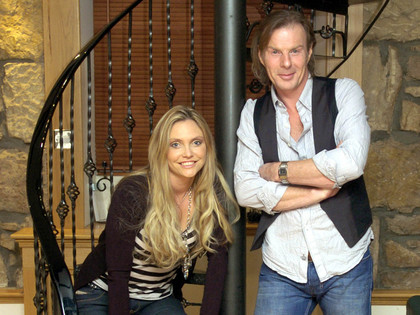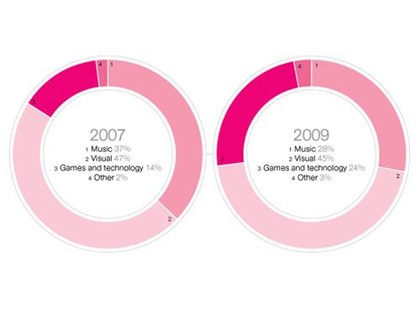
The Apple's iTunes Store became the biggest music retailer in the US last year with 25 per cent of all digital and physical music sales. Compare digital downloads alone, and iTunes' dominance rises to 69 per cent of the total US market.
In the UK the situation is arguably even worse, with iTunes share said to be around 90 per cent.
The impact of the iPod and iTunes is there for us all to see. Squeezed by supermarkets on the one side and digital downloads on the other, old school record shops have been rapidly disappearing from our high streets, leaving those that remain to focus on other, more profitable, areas instead. Last year HMV said music sales accounted for just 28 per cent of its revenue, a fall of 9 per cent in just two years.
Another complaint you'll hear from creatives about the iPod and digital downloads is that they've not only devalued the financial currency of music, but they've made it disposable too. Ian Morrow, record producer (Seal, Wet Wet Wet, Lisa Stansfield) and co-founder of Kerchoonz, the social networking and music download site says:
"I was listening to what Warners said about its decision to remove its music from streaming sites and they were talking about the value of music - and the value of music is really important. Just by it being like running water, everywhere all the time, it has no value. It is a complete commodity. There is no 'must go down to the record shop this afternoon, because they'll probably be sold out by Monday'."
That's great if you're a massive music fan who doesn't like paying huge sums for long-deleted albums, but it also means the artefact - the record, the song, the download - no longer has any intrinsic value - at least not to a certain generation.
You can download something one minute and delete it the next - there's no sense of ownership or occasion like you had with a CD or vinyl collection any more.
Sign up for breaking news, reviews, opinion, top tech deals, and more.

HELPING ARTISTS: Ian Morrow and Indiana Gregg are the founders of Kerchoonz
One thing that frequently gets laid at the iPod's door is the issue of sound quality: from the way music is consumed as low bit-rate MP3 and AAC files, to the oft-cited argument that music producers now mix music so it sounds great on the crappy earbuds bundled with iPods. In truth, it's actually a lot more serious than that, says Kerchoonz Ian Morrow:
"If you get a kid who wants to be an [sound] engineer and wants to work in studios, they're all listening to things outside the realm of the way you're meant to hear... If you want a drum kit to sound good, you need to listen to it in a room, not on headphones.
"That's a major thing with the kids that are coming through. Most of the kids that I've heard demos from, they're all crap - the drums sound terrible. The first thing I say to them is have you heard a drum kit - go and stand right in front of it.
"If it sounds crap when you listen to it, it's going to sound crap when you record it. Now when you listen to things on headphones all the time, you're never going to learn that perception of what sound actually is."
Morrow's Kerchoonz co-founder and singer/songwriter Indiana Gregg agrees:
"I see kids who are talented, who could be into music or becoming sound engineers, but their point of reference is so screwed up. If you're going to produce something that has the sound of an MP3, that's all we're going to have probably 20 years from now when they all grow up.
"Because if you don't have a point of reference... it's like being a musician without any influences. You grow up in a cave and suddenly you want to be the next Beethoven? It's not going to happen."

LESS ABOUT MUSIC: Music is becoming less important to HMV. This diagram from its 2009 financial results shows that music makes up 28 per cent of its revenue – a fall of 7 per cent since 2009
Alan O'Rouke, MD and founder of Vita Audio is more optimistic. His company is just one of the many that has adapted to the changed landscape brought about by the iPod:
"Apple Premium Resellers are doing good business on audio systems these days. People are buying them from there.
"They're not going into hi-fi shops. Hi-fi shops still have this strange enigma where you don't go in there unless you know what you're talking about, like the Not The Nine O'Clock News sketch, you know? Very true really. [Apple Premium Resellers] provide a bright, fresh environment where it's good to go in. A lot of hi-fi shops are fairly back in the Dark Ages.
Roger Batchelor, product marketing consultant at Denon is another optimist:
"Many artists have more freedom and are running their own websites and have more control over the way their music is distributed than ever before. Music has always been a commodity for some, even back in the '60s and '70s we had those Top Of The Pops LPs with studio bands playing the hits of the day for the casual listener.
"At the same time, there were, and still are, dedicated music fans who love music with a passion."